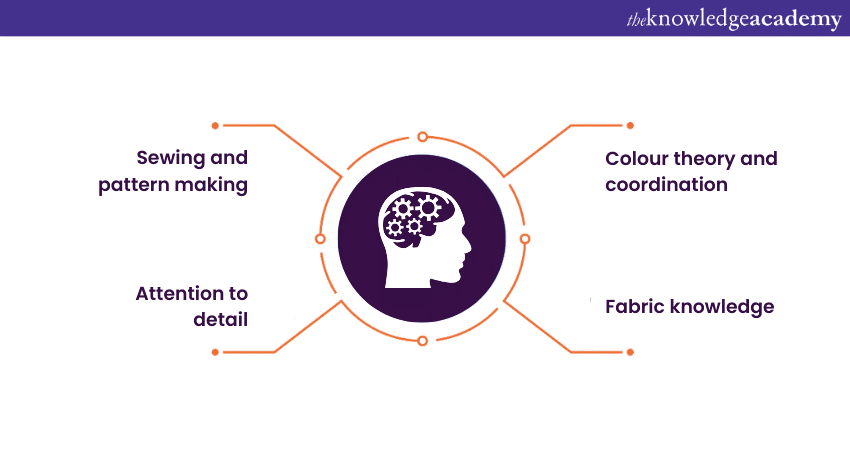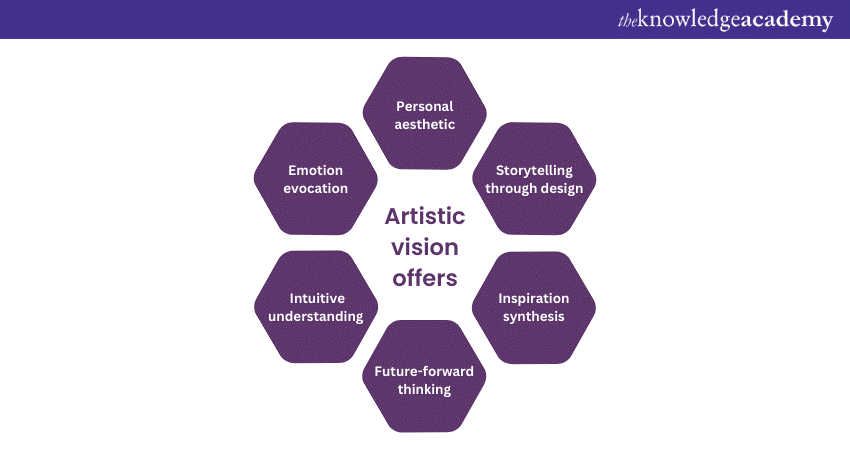We may not have the course you’re looking for. If you enquire or give us a call on + 1-866 272 8822 and speak to our training experts, we may still be able to help with your training requirements.
Training Outcomes Within Your Budget!
We ensure quality, budget-alignment, and timely delivery by our expert instructors.

Fashion is more than just clothing; it's a form of self-expression, an art form that speaks volumes without uttering a word. The world of Fashion Design is alluring, but it's not just about creating beautiful garments. To truly make your mark in this dynamic and competitive industry, you need a comprehensive set of Fashion Designer Skills beyond the runway.
A fusion of artistry, technique, and business acumen - in this blog, we will discuss the top 15 Fashion Designer Skills indispensable for a flourishing career in this fascinating world. Let's embark on this creative odyssey together as we explore the essential skills that will help you survive and thrive in the fashion industry.
Table of Contents
1) Creative skills
2) Technical skills
3) Market skills
4) Communication and business skills
5) Research and forecasting skills
6) Collaboration and time management
7) Conclusion
Creative Skills
Creativity and innovation lie at the heart of every remarkable Fashion Designer, allowing them to craft unique and captivating designs that set trends and leave a lasting impression. Additionally, the ability to sketch and illustrate ideas is the essential language of fashion, enabling designers to transform their imaginative concepts into visual blueprints.
Creativity and innovation
Fashion Design is a realm where the power of creativity and innovation reigns supreme. Every exceptional Fashion Designer possesses a keen sense of these qualities. To thrive in the industry, you must continually challenge the limits of your imagination, pioneering fresh concepts and forging a signature style that distinguishes you from the crowd.
Sketching and illustration
Among the bedrock skills demanded of Fashion Designers is the art of translating abstract visions into tangible designs on paper. Mastery of sketching and illustration serves as the bridge between your creative imagination and real-world realisation. It equips you with the ability to vividly convey your ideas to your team and clients, facilitating effective communication in the dynamic world of fashion.
Elevate your Fashion Design skills with Fashion Designing Training. Sign up now for a transformative journey!
Technical skills

Technical skills are the backbone of a Fashion Designer's toolkit, encompassing the practical expertise required to transform creative visions into tangible, flawlessly crafted garments. From sewing and pattern making to meticulous attention to detail, colour theory, and fabric knowledge, these skills are the essential building blocks that bring fashion concepts to life with precision and finesse.
Sewing and pattern making
The mastery of sewing and pattern making forms the backbone of a Fashion Designer's technical skills. It's the art of breathing life into your designs, understanding the architecture of garments, and crafting patterns that fit flawlessly. These skills are the fundamental building blocks upon which your creative visions take form.
Attention to detail
Fashion thrives on precision, where even the tiniest details wield substantial influence. Paying meticulous attention to each stitch, seam, and fabric choice is imperative. It's the pursuit of perfection that ensures your creations stand out as impeccably crafted works of art.
Colour theory and coordination
The art of colour theory and coordination is a technical skill that elevates your designs. Mastery in this area enables you to craft visually captivating collections by understanding the emotional resonance and mood-setting capacity of different colours. Your choice of colours can breathe life and narrative into your creations.
Fabric knowledge
Different fabrics have unique persmonalities, and a Fashion Designer must possess an extensive understanding of diverse textiles. This knowledge empowers you to select the ideal fabric for each design, considering how it will drape, move, and interact with the wearer. Your fabric expertise ensures that every garment not only looks exceptional but also feels comfortable and functional.
Market skills
Market skills are the compass that guides Fashion Designers through the ever-shifting currents of consumer preferences and industry trends. Staying attuned to the pulse of fashion and harnessing digital design tools are vital aspects of success in a dynamic and digitally-driven marketplace.

Trend awareness
In the fast-paced world of fashion, staying in tune with evolving trends is paramount. The fashion landscape constantly undergoes transformation, and keeping abreast of the latest trends and shifting consumer preferences is essential. This awareness not only ensures your designs remain relevant but also allows you to meet the ever-changing demands of the market, positioning you as a trendsetter in the industry.
Digital design skills
In the digital age, proficiency in computer-aided design (CAD) software is a hallmark of modern Fashion Designers. These digital tools have revolutionised the design process, offering precision and efficiency. Proficiency in CAD empowers designers to create, modify, and share their designs seamlessly. It's a skill that not only enhances the accuracy of your work but also keeps you competitive and adaptable in an industry that embraces technology as a means of artistic expression.

Communication and business skills
Communication and business skills are the dual engines propelling Fashion Designers towards success in an industry that marries creativity with commerce. Effective communication fosters collaboration and ensures that artistic visions align with practical considerations, while a keen understanding of business aspects equips designers to navigate the competitive fashion market with finesse.
Communication skills
Effective communication serves as the cornerstone of success for Fashion Designers. Whether collaborating with clients, team members, or manufacturers, the ability to convey your creative ideas with clarity and precision is indispensable. Equally important is the capacity to actively listen to feedback, ensuring that your vision aligns harmoniously with the expectations of stakeholders. In the world of Fashion Design, clear communication fosters seamless collaboration and paves the way for the realisation of your creative endeavours.
Business acumen
Beyond the realm of design, Fashion Designers must possess a robust understanding of the business facets of the industry. This encompasses a comprehensive knowledge of marketing strategies, budgeting, and sales tactics, all of which are critical for navigating the competitive fashion market. Business acumen empowers designers to not only create captivating collections but also effectively promote, budget for, and sell their creations, thereby establishing a sustainable and prosperous career.
Adaptability
The fashion world is a constantly shifting landscape, characterised by ever-changing trends and consumer preferences. For designers, adaptability is a key trait, allowing them to remain agile and open to fresh ideas. The ability to pivot swiftly and adjust to market fluctuations is essential for long-term success. In an industry where innovation and flexibility are highly valued, designers who embrace change and embrace new concepts are better positioned to thrive and make enduring contributions to fashion.
Research and forecasting skills
Research and forecasting skills are the crystal ball of the fashion world, allowing designers to glimpse into the future of style. These skills empower designers to stay ahead of trends, understanding the intricacies of consumer behaviour and cultural influences that shape the industry.
Trend forecasting
The ability to predict future fashion trends is a priceless skill that places designers at the forefront of the industry. This skill necessitates a commitment to in-depth research and meticulous analysis of consumer behaviours, cultural influences, and emerging movements. Trend forecasting is the compass that guides designers through the ever-evolving fashion landscape, enabling them to anticipate and adapt to shifts in consumer preferences and stay one step ahead in an environment where innovation and insight are paramount.
Collaboration and time management
In the world of fashion, collaboration is the symphony that transforms creative concepts into wearable art, while impeccable time management ensures that this artistry unfolds seamlessly, even under the ticking clock. These skills are the pillars upon which Fashion Designers build their masterpieces.
Collaboration
In the dynamic world of fashion, collaboration is the heartbeat of creativity. The industry thrives on collective efforts, and designers must excel at working seamlessly with teams of pattern makers, seamstresses, stylists, and other professionals. Effective collaboration brings diverse talents together, ensuring that each piece of the creative puzzle aligns harmoniously to bring a designer's vision to life. It's a skill that bridges artistic inspiration with practical execution and fosters the synergy required for fashion to flourish.
Time management
Fashion Designers operate in a realm where time is often a luxury they cannot afford. Tight deadlines are the norm, and effective time management skills are the compass that guides them through the demanding landscape. These skills not only ensure that projects are completed promptly but also uphold the highest standards of quality. Time management allows designers to maintain control over their creative processes, delivering meticulously crafted collections even under the pressure of time constraints.
Resilience
In the tumultuous terrain of the fashion industry, where trends shift like the wind, resilience is a designer's armour. This unwavering quality allows designers to weather the storm of setbacks and challenges, emerging stronger with every trial. It's the determination to persist through the highs and lows that forges a path to enduring success in this fiercely competitive realm.
Conclusion
In conclusion, the path to a successful career in Fashion Design is illuminated by a constellation of essential skills. From the spark of creativity and technical prowess to the ability to adapt and navigate market trends, every skill we've explored is a vital brushstroke on the canvas of a Fashion Designer's journey. Effective communication, collaboration, and time management are the orchestrators of seamless execution, while business acumen provides a strategic roadmap. The ability to forecast trends and, above all, resilience in the face of adversity are the cornerstones of longevity in this ever-evolving industry. Armed with these skills, aspiring designers can embark on their creative odyssey, confident in their ability to leave an indelible mark on the world of fashion.
Explore your passions and unlock new horizons with our diverse range of Hobbies and Interests Courses.
Frequently Asked Questions
Upcoming Business Skills Resources Batches & Dates
Date
 Fashion Designing Training
Fashion Designing Training
Fri 10th Jan 2025
Fri 14th Feb 2025
Fri 11th Apr 2025
Fri 23rd May 2025
Fri 8th Aug 2025
Fri 26th Sep 2025
Fri 21st Nov 2025







 Top Rated Course
Top Rated Course


 If you wish to make any changes to your course, please
If you wish to make any changes to your course, please


